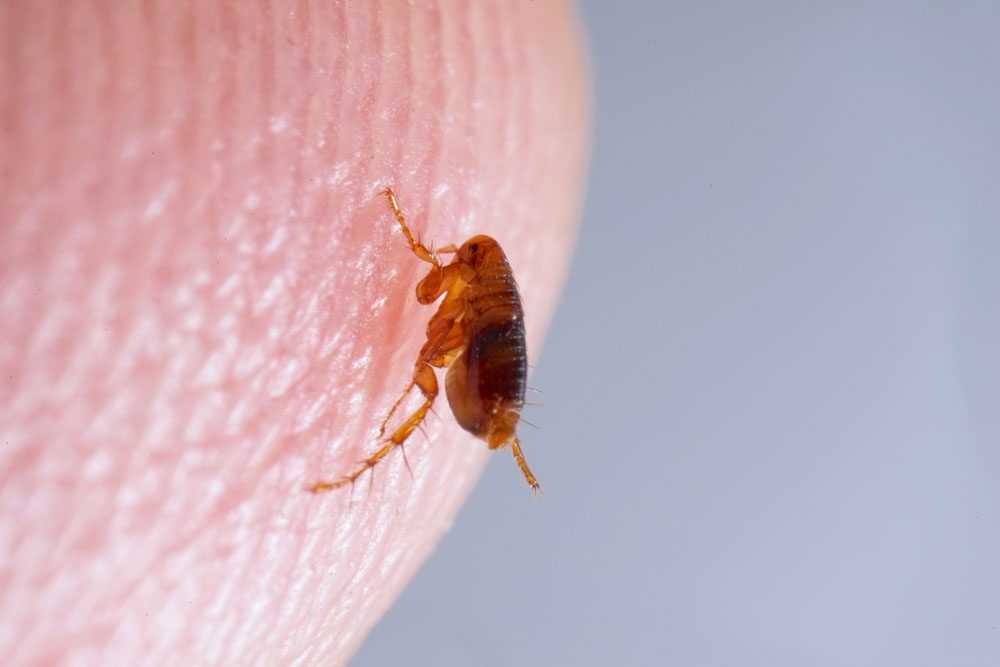Can Flea Bites Make You Sick? Understanding the Dangers
Fleas transmit diseases when they feed on the blood of their host animal. Humans, cats, dogs, and smaller mammals are usually their victims. The various species of fleas carry specific protozoan parasites, bacteria, and viruses which can cause serious illnesses in their hosts. These illnesses can be fatal if not caught in the early stages of the disease, which is the leading dangers of flea bites. Additionally, flea bites transmit diseases, making it crucial to manage flea populations effectively. Infected fleas can transmit various diseases to humans, including tapeworms, cat scratch disease, murine typhus, tungiasis, and bubonic plague.
What are Flea Bites?
Flea bites are small, discolored bumps on the skin caused by a flea feeding on blood. These tiny, wingless insects have dark brown or black bodies, a flat shape, six legs, and strong claws on the bottoms of their legs. Fleas are equipped with mouthparts that pierce the skin to feed on blood, and their hind legs are longer and stronger than their middle and front legs, allowing them to jump over 12 inches. With over 2,500 flea species worldwide and more than 300 species in the United States, flea bites are a common issue. While flea bites rarely cause lasting harm, they can be annoying and irritating. However, the real danger lies in the potential for flea bites to transmit diseases that can be serious or even fatal. The cat flea, in particular, is known to transmit diseases like typhus to humans.
Flea Feeding Behavior
Fleas feed on the blood of mammals and birds, and their feeding behavior is crucial to their survival. Adult fleas can transmit tapeworms to pets and humans when ingested during grooming. Female fleas lay eggs after feeding on blood, and in some flea species, baby fleas (larvae) feed on blood-rich adult flea poop, also known as flea dirt. This flea dirt serves as a vital source of nutrition for the larvae, especially in species that commonly infest dogs and cats. Fleas use their strong claws to hold onto a host, and their mouthparts include a tiny needle (proboscis) that pierces the skin, sucks blood, and secretes saliva into the bloodstream. This saliva can cause an allergic reaction, leading to itching and swelling, making flea bites itch and causing discomfort.
Where are Fleas Found?
Fleas thrive in warm weather and prefer cool, damp areas with shade, such as around trees, leaves, tall grass, and shrubs. They hop onto animals when they walk by these areas. On dogs, cats, and other animals, fleas typically live around the ears, neck, back, and belly. Once inside the home, fleas may jump off an infested animal and hide in carpet, furniture, bedding, and cracks in the floor. Outdoor areas like parks, gardens, and beaches are also common flea habitats, where they can easily infest pets and humans alike.
Do Fleas Bite Humans?
Yes, fleas do bite humans, although the species that commonly bother dogs and cats do not live on humans. Dogs and cats have more hair than humans, providing a perfect hiding spot for fleas. Fleas prefer animals with a lot of fur for their habitat. However, in the absence of an animal host, fleas will bite humans. Factors that attract fleas include the presence of animals with a lot of fur, warm weather, cool, damp areas with shade, and environments with tall grass, leaves, and shrubs.
Serious Risks from Flea Bites Transmit Diseases
- Anemia and iron deficiencies
- Bartonella
- Ehrlichiosis
- Lyme Disease
- Meningoencephalitis
- Parasitic Dermatitis
- Plague
- Rickettsia
- Cat scratch disease: An illness caused by the bacteria Bartonella henselae, often contracted through flea bites or scratches from infected cats. It can lead to serious health effects, particularly in immunocompromised individuals.
- Tapeworms
- Oriental rat flea: A significant vector for typhus, transmitting the disease through bites. The presence of Rickettsia typhi in flea feces plays a role in the transmission process.
Flea-Borne Diseases
Fleas are notorious for spreading diseases to humans and animals through their bites. Some of the most common flea-borne diseases include:
Typhus
Typhus is a bacterial disease caused by Rickettsia typhi, which is transmitted to humans through the bites of infected fleas, particularly the Oriental rat flea. Symptoms of typhus include fever, headache, nausea, body aches, and a rash. If left untreated, typhus can lead to serious complications, such as kidney failure and respiratory distress. Treatment typically involves antibiotics, and prompt medical attention is essential to prevent long-term damage.
Cat Scratch Disease
Cat scratch disease, also known as bartonellosis, is a bacterial infection caused by Bartonella henselae. It is typically spread through the bites of infected fleas, which can transmit the bacteria to humans. Symptoms of cat scratch disease include fever, fatigue, swollen lymph nodes, and a rash. In severe cases, the disease can cause more serious complications, such as encephalitis and osteomyelitis. Treatment usually involves antibiotics, and in some cases, hospitalization may be necessary.
Flea Bite Symptoms That Should Be Addressed
Several symptoms beyond the itch can result from a flea bite. It is not just an annoyance but it is usually accompanied by red swollen spots with a puncture similar to a mosquito bite. Flea bites can be confused with bed bug bites, as both can cause itching and allergic reactions, but they are distinct in appearance. More severe symptoms from flea bites can also develop. Flea bites can also be mistaken for mosquito bites, so knowing the cause of a bite is important for appropriate diagnosis and treatment. If they do, it’s important to seek immediate medical advice. The dangers of flea bites are real and can cause irreversible consequences.
- Chest pain – tight, crushing pain, or heavy pressure in the chest region
- Chills – the sensation of feeling cold
- Delirium – acute confused state
- Dyspnea – difficulty breathing
- Fatigue – extreme exhaustion
- Fever – hyperthermia as in an increase in body temperature
- Hemoptysis – coughing up blood
- Headache – severe head and neck pain
- Hypotension – extremely low blood pressure
- Malaise – the sense of feeling extremely ill
- Shock – fast, shallow breathing, weak but rapid pulse, cold, clammy skin, fainting, weakness, and/or dizziness
- Hive-like lesions – raised red patches on skin
Complications of a Single Flea Bite
While a single flea bite may seem harmless, it can lead to several complications, including:
- Allergic reactions: Some people may experience an allergic reaction to flea bites, which can range from mild to severe. Symptoms can include itching, swelling, redness, and blistering.
- Infection: Flea bites can become infected if scratched or bitten, leading to bacterial infections such as cellulitis or abscesses.
- Disease transmission: Fleas can transmit diseases such as typhus, cat scratch disease, and tapeworms through their bites.
- Anemia: In severe cases, flea infestations can lead to anemia, particularly in pets.
Treat Flea Bites
If one or more of the symptoms is seen, medical advice should be sought. Many times there are topical treatments available for the minor symptoms to treat flea bites. To stop flea bites from itching, over-the-counter anti-itch creams and oral antihistamines can be used. For the more severe signs of illness, stronger oral medication may be required. Treatments will differ depending on the patient to combat the dangers of fleas. Antifungal and antibiotic medicines are also available depending on the severity of the disease caused by the flea bite.
For the family’s protection, it is necessary to entirely remove the possibility of further flea attacks and infections. You should call a team of professional pest control experts like PURCOR. With our experience, we will be able to help remove any dangers of fleas that exist. Administering professional measures to exterminate the fleas along with periodic applications should assist in deterring any future infestations. Contact us to request a quote today!
Natural Home Remedies for Flea Bites
While flea bites can be itchy and uncomfortable, there are several natural home remedies that can help alleviate symptoms. Some of these remedies include:
- Cold compress: Applying a cold compress to the affected area can help reduce itching and swelling.
- Baking soda: Baking soda can help neutralize the acid in flea saliva that causes itching. Mix baking soda with water to form a paste and apply it to the affected area.
- Aloe vera: Aloe vera has anti-inflammatory properties that can help soothe itchy skin. Apply aloe vera gel to the affected area to reduce itching and inflammation.
- Tea tree oil: Tea tree oil has antiseptic properties that can help prevent infection. Mix a few drops of tea tree oil with a carrier oil and apply it to the affected area.
It’s essential to note that while these remedies can help alleviate symptoms, they may not eliminate the underlying infestation. If you suspect a flea infestation, it’s crucial to take steps to eliminate the fleas and prevent future bites.
Preventing Flea Bites
Preventing flea bites requires a multi-faceted approach. The most effective way to keep fleas out of the house is to protect your pets with preventatives. Pet parents should use a flea preventative year-round, even for indoor-only cats. Regular vacuuming and washing pet bedding can help remove any fleas that do find their way into your home before they can cause problems. There are also indoor sprays that can be safely used within the home to repel and kill fleas. Treating the yard is also helpful in keeping fleas out of the lawn. It is essential to only use products that are specifically designed to be safe around pets. Additionally, using a flea comb can help remove fleas and their eggs from your pet’s coat, providing an extra layer of protection against flea infestations.
"*" indicates required fields
"*" indicates required fields




